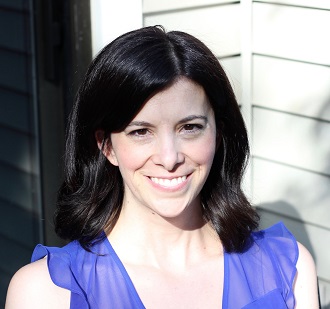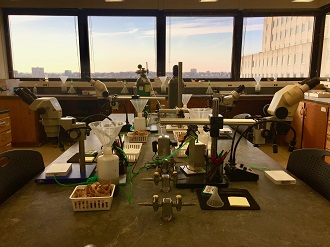About the department:
Barnard College is a liberal arts college for women affiliated with Columbia University in New York City. This affiliation gives faculty and students the best of both worlds: a small liberal arts college environment with access to the resources of a large research school. Faculty in the Biology Department specialize in diverse fields of biology, and students can conduct research at Barnard, Columbia, or other institutions throughout the New York City area.
About the research:
My research uses the fruit fly model system, Drosophila melanogaster, to examine the evolutionary and genetic causes and consequences of sexual selection and sexual conflict. Specifically, I am interested in the evolution of male and female sexual behaviors and mate choice preferences, and the extent to which male-female interactions are beneficial or costly to each sex. My research uses an integrative approach, drawing from the fields of animal behavior, evolutionary biology and genetics.
What has been the biggest challenge as a new PI so far?
Without a doubt, my biggest challenge as a PI so far has been navigating the COVID-19 pandemic. There are the obvious challenges associated with keeping our fruit flies alive while shutting down the research lab (I’ve been maintaining them from home), remote teaching, and “working” from home with a 3-year-old. But the biggest challenge was trying to maintain a sense of community among lab members when we couldn’t be together: walking the balance between providing a sense of normalcy while also acknowledging that things were in no way normal, and communicating that it was ok not to be ok. I’m still working on this balance.
How do you/will you approach mentoring new lab members?
Work in my lab is very collaborative in that all students help care for the fruit fly populations and help each other with their experiments. Training new lab members is usually a group effort and we hold regular lab meetings to introduce new members to the projects they are helping with. I also try to meet one-on-one with new students in my lab at least twice a semester to get a feel for their interests and short/longer-term goals.
Are you recruiting? If so, how do you/ will you choose new lab members?
My lab is composed entirely of undergraduates, so I recruit new lab members almost every semester as students graduate, new projects start, and class schedules change. I try to attract a diverse group of applicants by sending out an email announcement when I’m looking for students, but beyond that, it largely comes down to enthusiasm for our research and schedule compatibility (are you available when the flies need you?).
When was your first Evolution Meeting, and how did it affect your career?
I’m dating myself here, but my first Evolution Meeting was the 2004 meeting in Fort Collins, Colorado. I had just started my Master’s program and was so nervous about giving a talk at such a large, international conference. The meeting was so influential for me – it was when I decided I definitely wanted to pursue a PhD. I was a first-generation college student who discovered research relatively late, but the meeting was one of the first times I could really “see” myself as an evolutionary biologist and felt a part of this academic community.
Do you remember your first publication in Evolution or Evolution Letters (acceptance or rejection)?
I definitely remember my first (first-author) publication in Evolution! I had accumulated several rejections from Evolution over the years, but kept trying! Good thing I did - the rejection streak was broken in 2015, which was followed by two more acceptances over the next three years.
Do you teach evolution? What concept blows students’ minds?
I teach an animal behavior class with a strong evolution focus. I think the main concept that blows students’ mind is natural selection’s ability to produce amazing and bizarre adaptations in animals. Bombardier beetles that release caustic gas when attacked; the Iranian spider-tailed viper that mimics a spider to attract prey; birds-of-paradise courtship rituals; parasites that can manipulate the behavior of their hosts. It’s so fun to introduce these examples and see jaws drop!
Do you have a favorite science podcast or blog?
Although he no longer technically has a blog, I’m a huge fan of anything written by Ed Yong, and have followed him since his Not Exactly Rocket Science days.
What one piece of advice would you give to a starting graduate student?
Get on Twitter! Even if you never tweet and only follow, I find the academic community on Twitter to be a (generally) supportive place. Being part of this community can help you network, learn about new discoveries in your field and beyond, and give you access to individuals, viewpoints and representation beyond your home institution.
How was your first faculty meeting?
It might not have been my first faculty meeting, but at one of my earliest meetings we discussed a faculty search we were doing that year. I had been on the job market for several years and it was such a surreal experience to see a job search from the other side!
Do you remember making any mistakes as a trainee; how did you recover?
So many mistakes (even now as a PI)! Improper labeling, losing flies, forgetting to do something that was time sensitive, accidentally putting flies in the freezer instead of the incubator. I make sure students in my lab know I’ve made mistakes so that when they do, they are (hopefully) comfortable telling me so we can problem solve together and come up with a strategy to avoid similar mistakes in the future.
What do you enjoy doing in your free time?
My free time is mainly spent trying to get outdoors with my husband and daughter. We live north of the city, so there are lots of hiking trails, rivers and lakes to explore.
 Alison Pischedda
Alison Pischedda